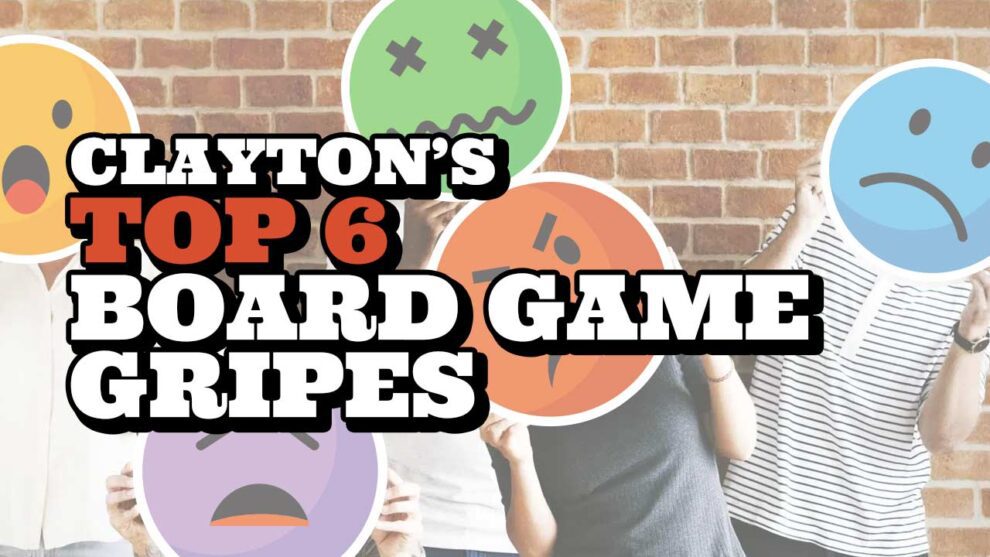For all the wonderful things that this hobby brings to the table (yes, that was intended), there are some rather less-than-savory ingredients mixed in as well. I’m about to discuss my six most frustrating, annoying, and sometimes painful, things I’ve encountered in gaming.
Spoiler Warning
This is a rant. It’s a big, fat, slimy, whiny rant that I’m not ashamed about because this stuff needs to be said. Now that that is out of the way, I’m about to rally some people, offend others, make some people laugh, and maybe even some others cry, but it’s all in good fun kind of, because I’m going to be quite subjective here since these are all my experiences (in no particular order).
So, feel free to laugh and get angry with me and agree and disagree and agree to disagree and leave comments and suggest other things that should have been mentioned. This is literally your chance to get a glimpse into what my bugbears are, so enjoy it. Or don’t. It’s really up to you. You’ve been warned.
Mini Cards
I have guitar player’s fingers. This means they’re long and dexterous and should be able to deal in the small and precise as easily as the large and cumbersome. But believe me, when I say I struggle with handling mini cards, it’s a real struggle.
Mini cards have made their way into many games, and some publishers, like [cough] Fantasy Flight and [hack] CMON, like to include them in almost every title. Sometimes, these small cards have a place, such as the small gear cards featured in Kingdom Death: Monster, where it makes functional sense to keep them small. I’m referring here to mini cards used in decks that get shuffled in place of standard size cards. Let me break it down why these are such a problem:
- I hate them.
- They could actually be a hindrance to accessibility for someone with arthritis or carpal tunnel syndrome.
- They’re very difficult to shuffle.
- They’re difficult to read from the opposite side of the board when you need to read them.
- Did I mention that I hate them?
So, there you have it. Scientific evidence that if mini cards can be avoided, they should be avoided. So why do publishers keep using them? Honestly, I have no idea, because there is no good reason unless it functionally makes sense for the game. Maybe they’re saving money, but at the cost of accessibility. But I could speculate all day on this. It feels like they’re making fun of us, though.
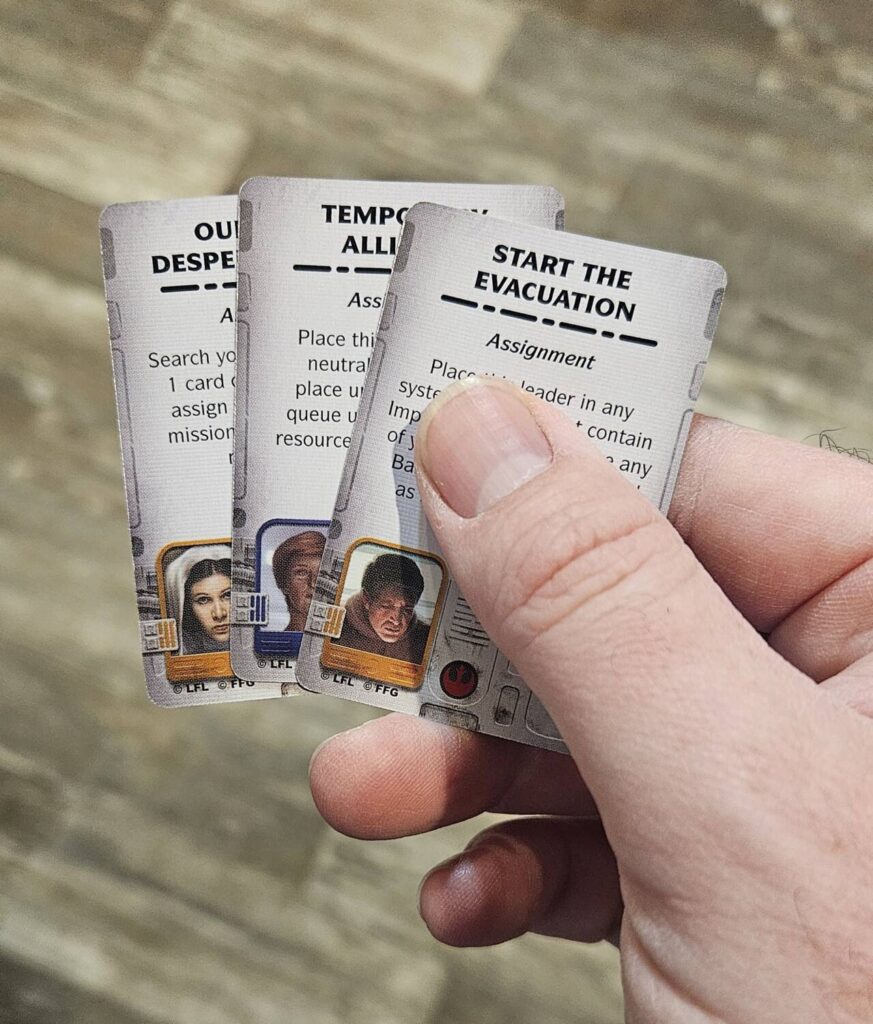
My Shelf of Shame
For those not in the know, the “Shelf of Shame” (sometimes optimistically called the “Shelf of Opportunity”) is the group of games within your collection that haven’t ever made it to the table. For some, like me, it’s a literal shelf full of games. Some of those games haven’t even been punched. It’s frustrating to no end when I see these games. But even more frustrating are the reasons behind such an abomination.
- Lack of Risk Takers – I’ll admit, being an adult who has limited time makes it difficult to take the leap of faith that’s required to try out a new game. It’s like when you go out to eat, you stick with the meals you’re familiar with because who wants to throw their limited money away on something they don’t like? It’s more common than not that members of whatever group I’m gaming with would rather play what they know and are comfortable with than try something new. But remember, even your favorite games had a first play. You could be missing out on a new gem.
- Campaign Commitments – A lot of games I’m into feature lengthy campaigns. That’s fine…for me. However, it’s not easy finding a group of 3-5 people who are always available at a regular time on the same nights, and who are also willing to commit to the same game week after week. That’s okay for normal games, but it halts a campaign.
- Crowdfunding – My FOMO is as real as the day is long. I blame crowdfunding for that (and Awaken Realms). I’ve gone all in on so many games that, quite frankly, will probably never get played, simply because of how bad I don’t want to miss the chance to play them. Unfortunately, that also means a lot of used shelf space by unused games, expansions, and stretch goals.
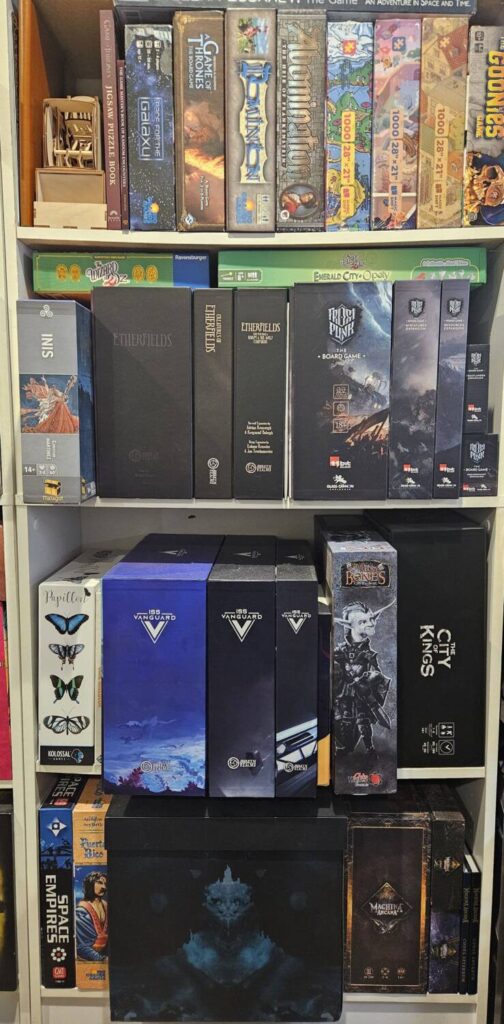
The Shelf of Shame doesn’t look to be going anywhere anytime soon unless I just force people into game nights with me. I could force people into game nights with me…
Bad Player Habits
I like to think that our hobby is accepting and tolerant of all people. This goes without saying, though, that if you’re accepting everyone, you have to be ready to accept some of the bad with some of the good. Unfortunately, some players have picked up real bad habits that I think should be addressed.
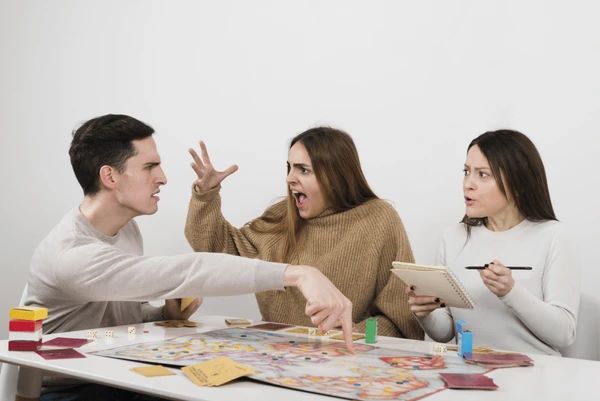
- Table Flipping / Rage Quitting – The ultimate guarantee that you won’t be invited back, game night or not. Rage quitting alone is the sign of a sore loser and shows you’re taking the game way too seriously. Flipping the table (something I’ve never seen done) is a big no-no.
- Hate Drafting – This is where you draft a card, not because you want or need it, but so someone else doesn’t get it. On its own, it’s a fair and fun strategy. But please don’t be that player that sacrifices their own game to only hate draft. No one wants to play with you.
- Kingmaking – When one or more players are able to control the game and determine the winner (or sometimes the loser), they are kingmaking. Some games, such as Ankh have this built in, and others, like Inis, make it available to do so, but it’s up to the players. There was one time, though, that I was playing Catan on Board Game Arena, and during the draft at the very beginning of the game, the other three players coordinated their placements to box me in. I couldn’t quit because I’d take a karma hit. My only option was to watch those three play. They turned a four-player game to a three-player game before the game ever got started. I was very irritated, to say the least. I promise I’m not still bitter.
- Meta-Gaming – If I have the choice of two players to attack, and I attack Player A because Player B bought lunch for me earlier, even if it makes more strategic sense to attack Player B, I’m meta-gaming. This creates unfair advantages and disadvantages in the game and should be avoided.
- Quarterbacking – I once played Pandemic with a player who wouldn’t let anyone else decide their own next move. He had to control the table, how people played, and what our next moves were. This is quarterbacking, folks. He also rage quit when I pointed it out, asking if we even wanted to win.
- Gatekeeping – This is what happens when a person decides that other people, for whatever reason, aren’t worthy to enjoy a hobby or activity. “Never played Ticket to Ride, so you can’t be a true gamer.” That’s gatekeeping. “You’re not really into gaming if all you play are Monopoly, Scrabble, and standard card games.” That’s gatekeeping. Gatekeeping is not welcome in any activity, and especially not one as inclusive as gaming.
Ultimately, the best way to avoid these and other habits is to just enjoy the game for what it is. Games, while fun, can be useful tools to encourage social interaction and to establish and build relationships. No designer would want their games to get in the way of that. So have fun, make friends, build on existing friendships, and above all, don’t be a grump to play with.
Too Much / Not Enough Space
Imagine buying a bag of chips. You get settled in, you go to open the bag, and much to your chagrin, three quarters of the bag is air, and the rest is actual chips. What a terrible universe that would be to live in.
[Insert mandatory record scratch]Turns out, that is the universe we live in, and while delicious chips have a good reason for this, they aren’t the only thing affected. By a show of hands, how many of you have seen the inside of the Splendor box? I couldn’t see your hands raise, so I’m going to assume there were a lot of you. Splendor is our potato chip game. The insert for the contents takes up more space than the actual contents, and the contents could fit in a sandwich bag. Why did they feel the need to make the box so much bigger than the game?
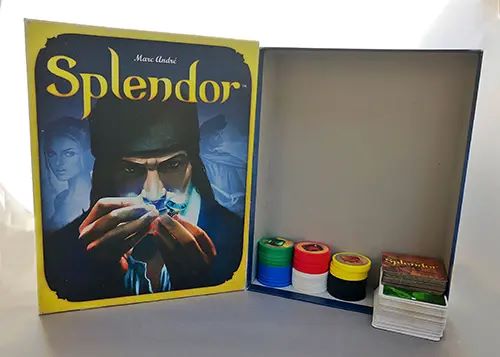
Splendor isn’t the only game with spatial awareness issues, though. Have any of you ever tried to get Gloomhaven back in its default box and inserts after punching all that cardboard? You almost have to have a doctorate in engineering to figure that one out. Something tells me these boxes and inserts were designed by people who weren’t interested in playing the games. So frustrating.
(For ideas on using a 3D printer to make your games more appealing, or, in Splendor’s case, to better utilize your space, check out Tom’s article, Top 6 3D Printed Board Game Add-ons.)
The Board Game Backpack
Gen-Con, and other conventions like it, are crowded places. There is a lot to see, and there are a lot of people to avoid getting too close to. So, believe me when I say that it takes a special kind of uncaring and unapologetic person to cram 30 to 50 lbs. of games into an oversized tortoise shell of a backpack, then proceed to walk around in a place like that.
These backpacks are no joke. One almost knocked me over. Did the guy notice? No, and he wouldn’t with a buffer the size of a small refrigerator on his back. I get the appeal if you’re going on a trip or to a game night. But there is no reason to be sporting your Frigidaire on your back at a crowded convention.

This sort of behavior has just made me hate these backpacks in general. They’re bigger than a proton pack, they stick out a good foot to foot and a half from the wearer’s back, they’re hard as a rock, and they make me think things like “I wonder how top heavy that person is with that thing on.” Just leave the backpacks at home.
Bad Rulebooks
The following is a standard setup, in order, which all rulebooks should follow:
- List of contents (with pictures)
- Setup (with pictures)
- Object of the game and end game trigger
- Overall flow of a game turn
- Breakdown of how to perform each step in the overall flow mentioned above
- End of round breakdown
- End game scoring
- Glossary / iconography
- Game rules summary
The following is how the Nemesis rulebook is laid out:
- List of contents
- Object of the game (without end game trigger)
- Game intro
- Setup part 1
- Setup part 2
- Flow of the game
- Player goals
- End of game trigger
- Who won?
- Objectives
- Possible actions
- Moving
- Combat
- Enemy combat
- Items
- Room summary
- Game modes
- Rule summary
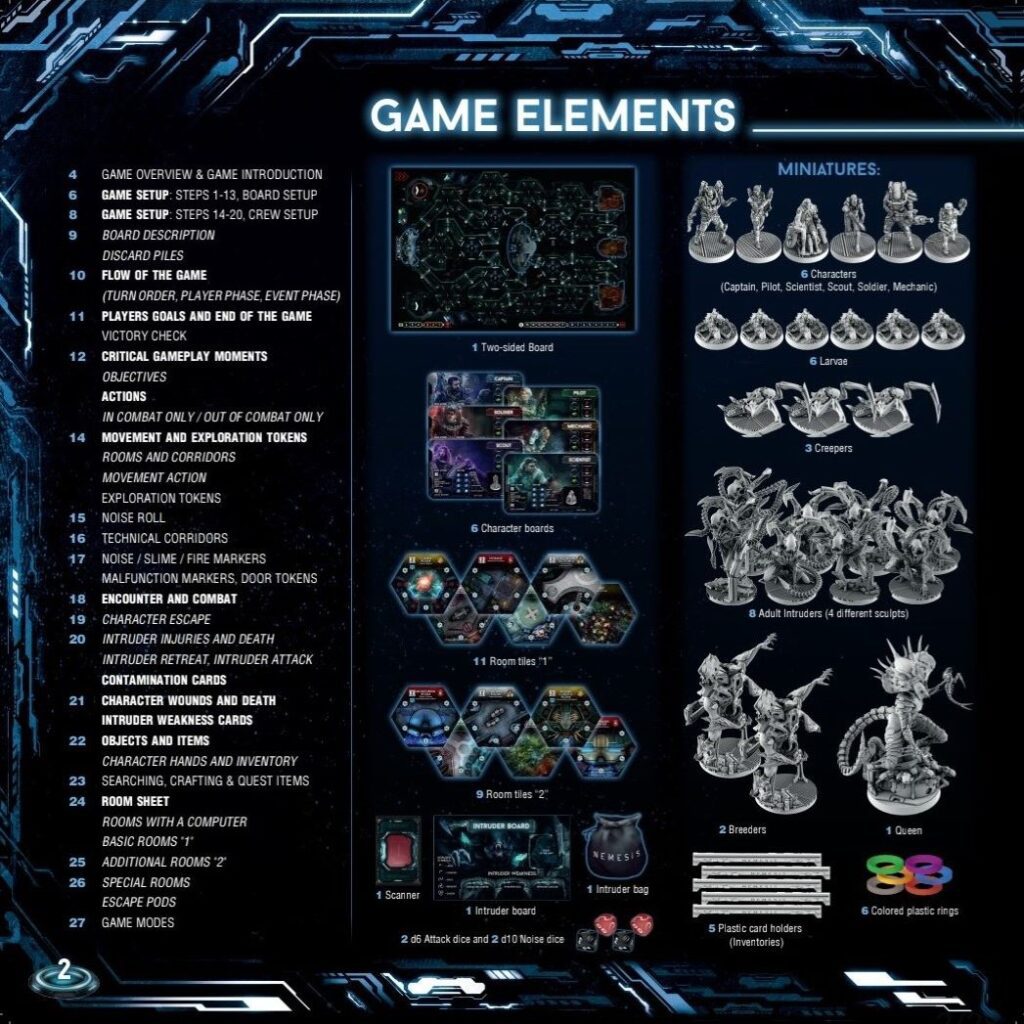
It’s a great game, but you spend more time flipping back and forth in the Nemesis rulebook than you do actually playing the game. Nothing is laid out in a way that makes any sense, and some of the fiddlier rules are buried deep in chapters they don’t seem to fit naturally in.
Terraforming Mars? I had to watch a two-part tutorial to figure that one out because the rulebook was such a mess. This should be optional but not required. If you can’t learn how to play the game from the rulebook, and you can’t be off and running within about 2-3 game rounds without the rulebook, your rulebook needs rewritten. Please see to that.
Wrapping Up
In summary, I love this hobby. But, like any other hobby, there are definitely some irksome things within it. I think a lot of it is out of our control, but what we can control is how we present ourselves to other players. Just remember to be nice, considerate, understanding, accepting, and above all, fair. Everyone deserves a chance to enjoy gaming.
Remember, this list was only my very subjective opinion. If you feel something isn’t correct, or you disagree, or you agree, or you have another suggestion, leave a comment below, and let’s fire up a conversation about it! Thanks for reading!


